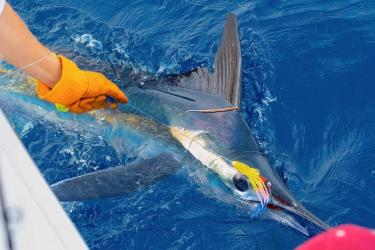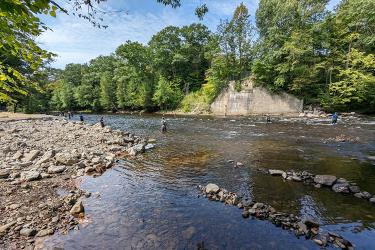Sixth grade students from Maryland’s Matapeake Middle School recently turned wetlands into their classroom for a day. Their field experiences helped bring their traditional classroom learning to life. Sultana Education Foundation led the students through activities and discussion that connected students to the role that wetlands play in the Chesapeake Bay.
The Matapeake students’ day was part of a Chesapeake Bay Watershed Education and Training funded effort. The Sultana Education Foundation’s “Wild Wetlands” program aims to give all sixth grade students in Queen Anne’s County Public Schools a meaningful watershed educational experience. These experiences include learning both outdoors and in the classroom, and they help students understand their local environment.
For approximately 550 Queen Anne’s County students over the course of the year, that means learning about wetlands and the role they play in the ecosystem. Wetlands improve water quality and provide habitat for a wide variety of Chesapeake Bay species.
“When students step outside the four walls of their classrooms and into their local environment, they begin to see the relevance of their learning in powerful and meaningful ways,” said Michael Page, supervisor of environmental literacy, health, physical education, and science for Queen Anne’s County Public Schools. “These experiences make concepts more tangible, especially when they relate directly to the environmental issues that affect our local community, such as water quality in the Chesapeake Bay, habitat restoration, or sustainable land use.”
During their day of learning at Sultana’s campus in Chestertown, Maryland, students collected water and conducted water chemistry testing. They caught critters from a pond in the wetland with dip nets, dissected crayfish, and more.
“Students were particularly excited and intrigued by catching zooplankton and examining the specimens up close under microscopes. They have all heard the term ‘plankton’ from the character on SpongeBob, but few had ever seen live plankton or stopped to consider the critical role they serve at the base of the food pyramid,” noted Chris Cerino, Vice President of Sultana Education Foundation. “While the students generally enjoy all these activities, it is particularly cool to see them making direct connections between what they have already learned in the classroom and what they are experiencing in the field.”
“This meaningful watershed educational experience focuses specifically on the important role that wetland habitats play in providing area flora and fauna with food and habitat, as well as serving as natural filtration systems for water entering the Chesapeake Bay and its tidal tributaries,” said Cerino.
NOAA Chesapeake Bay Office administers the Chesapeake Bay Watershed Education and Training program.






